Communication Tools and Strategies for Recovery from Crises in Paris
VerifiedAdded on 2023/01/13
|14
|4272
|38
AI Summary
This case study explores the communication tools and strategies adopted by Paris as a tourism destination for effective recovery from crises, specifically focusing on the terrorist attack in November 2015. It also discusses the application of theoretical approaches for crises management and evaluates the proactive and reactive strategies of crises management adopted by destinations at a global level.
Contribute Materials
Your contribution can guide someone’s learning journey. Share your
documents today.
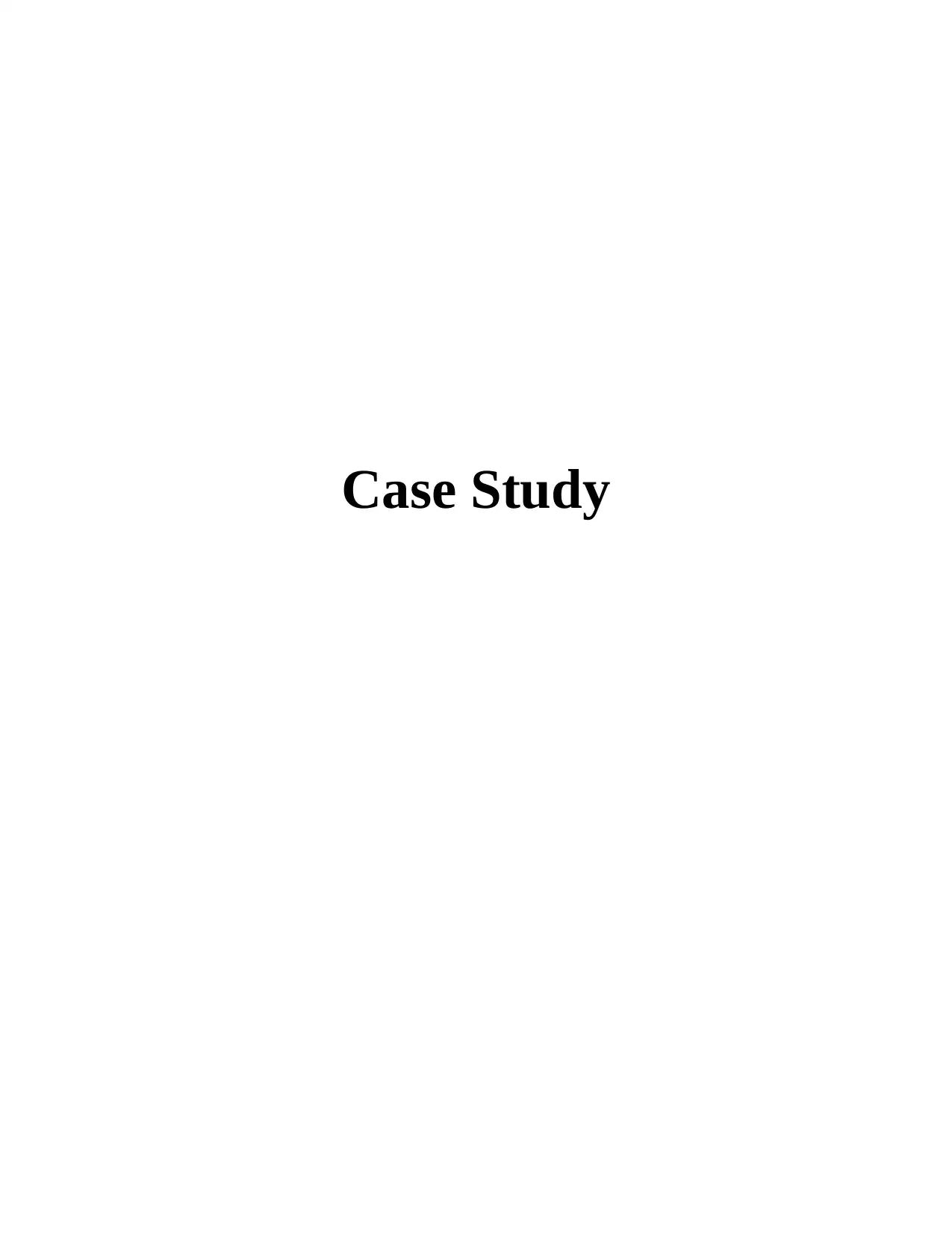
Case Study
Secure Best Marks with AI Grader
Need help grading? Try our AI Grader for instant feedback on your assignments.
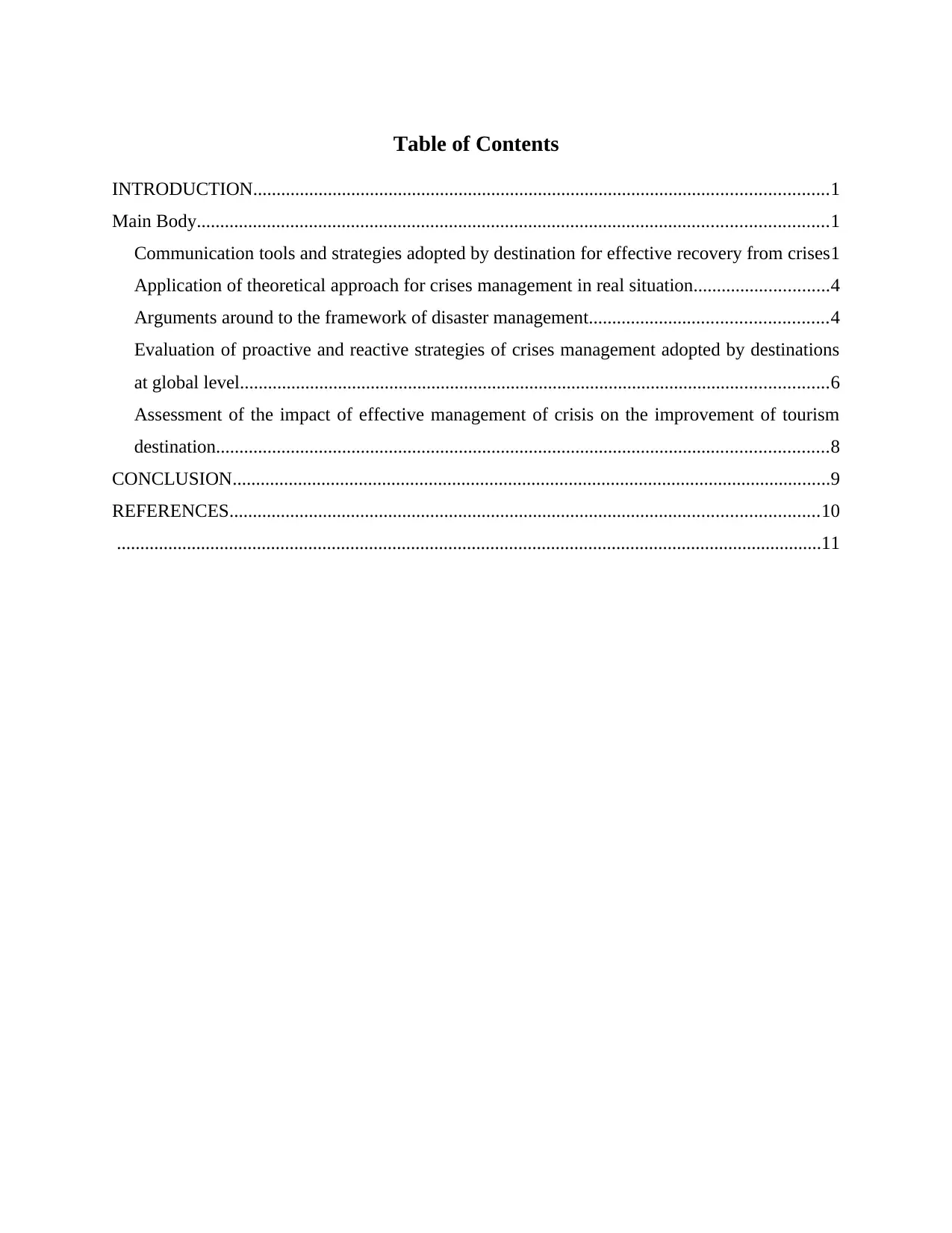
Table of Contents
INTRODUCTION...........................................................................................................................1
Main Body.......................................................................................................................................1
Communication tools and strategies adopted by destination for effective recovery from crises1
Application of theoretical approach for crises management in real situation.............................4
Arguments around to the framework of disaster management...................................................4
Evaluation of proactive and reactive strategies of crises management adopted by destinations
at global level..............................................................................................................................6
Assessment of the impact of effective management of crisis on the improvement of tourism
destination...................................................................................................................................8
CONCLUSION................................................................................................................................9
REFERENCES..............................................................................................................................10
.......................................................................................................................................................11
INTRODUCTION...........................................................................................................................1
Main Body.......................................................................................................................................1
Communication tools and strategies adopted by destination for effective recovery from crises1
Application of theoretical approach for crises management in real situation.............................4
Arguments around to the framework of disaster management...................................................4
Evaluation of proactive and reactive strategies of crises management adopted by destinations
at global level..............................................................................................................................6
Assessment of the impact of effective management of crisis on the improvement of tourism
destination...................................................................................................................................8
CONCLUSION................................................................................................................................9
REFERENCES..............................................................................................................................10
.......................................................................................................................................................11

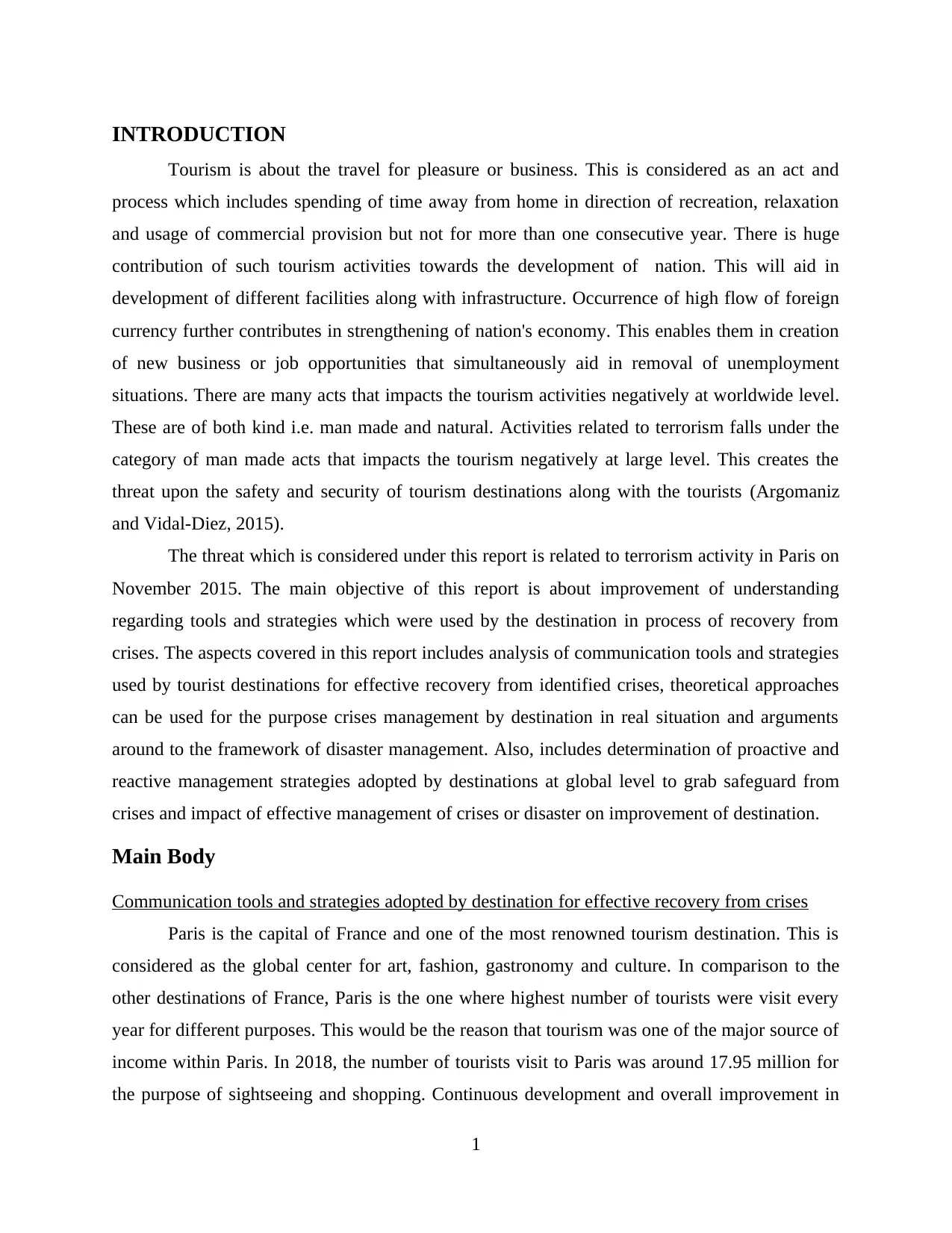
INTRODUCTION
Tourism is about the travel for pleasure or business. This is considered as an act and
process which includes spending of time away from home in direction of recreation, relaxation
and usage of commercial provision but not for more than one consecutive year. There is huge
contribution of such tourism activities towards the development of nation. This will aid in
development of different facilities along with infrastructure. Occurrence of high flow of foreign
currency further contributes in strengthening of nation's economy. This enables them in creation
of new business or job opportunities that simultaneously aid in removal of unemployment
situations. There are many acts that impacts the tourism activities negatively at worldwide level.
These are of both kind i.e. man made and natural. Activities related to terrorism falls under the
category of man made acts that impacts the tourism negatively at large level. This creates the
threat upon the safety and security of tourism destinations along with the tourists (Argomaniz
and Vidal-Diez, 2015).
The threat which is considered under this report is related to terrorism activity in Paris on
November 2015. The main objective of this report is about improvement of understanding
regarding tools and strategies which were used by the destination in process of recovery from
crises. The aspects covered in this report includes analysis of communication tools and strategies
used by tourist destinations for effective recovery from identified crises, theoretical approaches
can be used for the purpose crises management by destination in real situation and arguments
around to the framework of disaster management. Also, includes determination of proactive and
reactive management strategies adopted by destinations at global level to grab safeguard from
crises and impact of effective management of crises or disaster on improvement of destination.
Main Body
Communication tools and strategies adopted by destination for effective recovery from crises
Paris is the capital of France and one of the most renowned tourism destination. This is
considered as the global center for art, fashion, gastronomy and culture. In comparison to the
other destinations of France, Paris is the one where highest number of tourists were visit every
year for different purposes. This would be the reason that tourism was one of the major source of
income within Paris. In 2018, the number of tourists visit to Paris was around 17.95 million for
the purpose of sightseeing and shopping. Continuous development and overall improvement in
1
Tourism is about the travel for pleasure or business. This is considered as an act and
process which includes spending of time away from home in direction of recreation, relaxation
and usage of commercial provision but not for more than one consecutive year. There is huge
contribution of such tourism activities towards the development of nation. This will aid in
development of different facilities along with infrastructure. Occurrence of high flow of foreign
currency further contributes in strengthening of nation's economy. This enables them in creation
of new business or job opportunities that simultaneously aid in removal of unemployment
situations. There are many acts that impacts the tourism activities negatively at worldwide level.
These are of both kind i.e. man made and natural. Activities related to terrorism falls under the
category of man made acts that impacts the tourism negatively at large level. This creates the
threat upon the safety and security of tourism destinations along with the tourists (Argomaniz
and Vidal-Diez, 2015).
The threat which is considered under this report is related to terrorism activity in Paris on
November 2015. The main objective of this report is about improvement of understanding
regarding tools and strategies which were used by the destination in process of recovery from
crises. The aspects covered in this report includes analysis of communication tools and strategies
used by tourist destinations for effective recovery from identified crises, theoretical approaches
can be used for the purpose crises management by destination in real situation and arguments
around to the framework of disaster management. Also, includes determination of proactive and
reactive management strategies adopted by destinations at global level to grab safeguard from
crises and impact of effective management of crises or disaster on improvement of destination.
Main Body
Communication tools and strategies adopted by destination for effective recovery from crises
Paris is the capital of France and one of the most renowned tourism destination. This is
considered as the global center for art, fashion, gastronomy and culture. In comparison to the
other destinations of France, Paris is the one where highest number of tourists were visit every
year for different purposes. This would be the reason that tourism was one of the major source of
income within Paris. In 2018, the number of tourists visit to Paris was around 17.95 million for
the purpose of sightseeing and shopping. Continuous development and overall improvement in
1
Secure Best Marks with AI Grader
Need help grading? Try our AI Grader for instant feedback on your assignments.
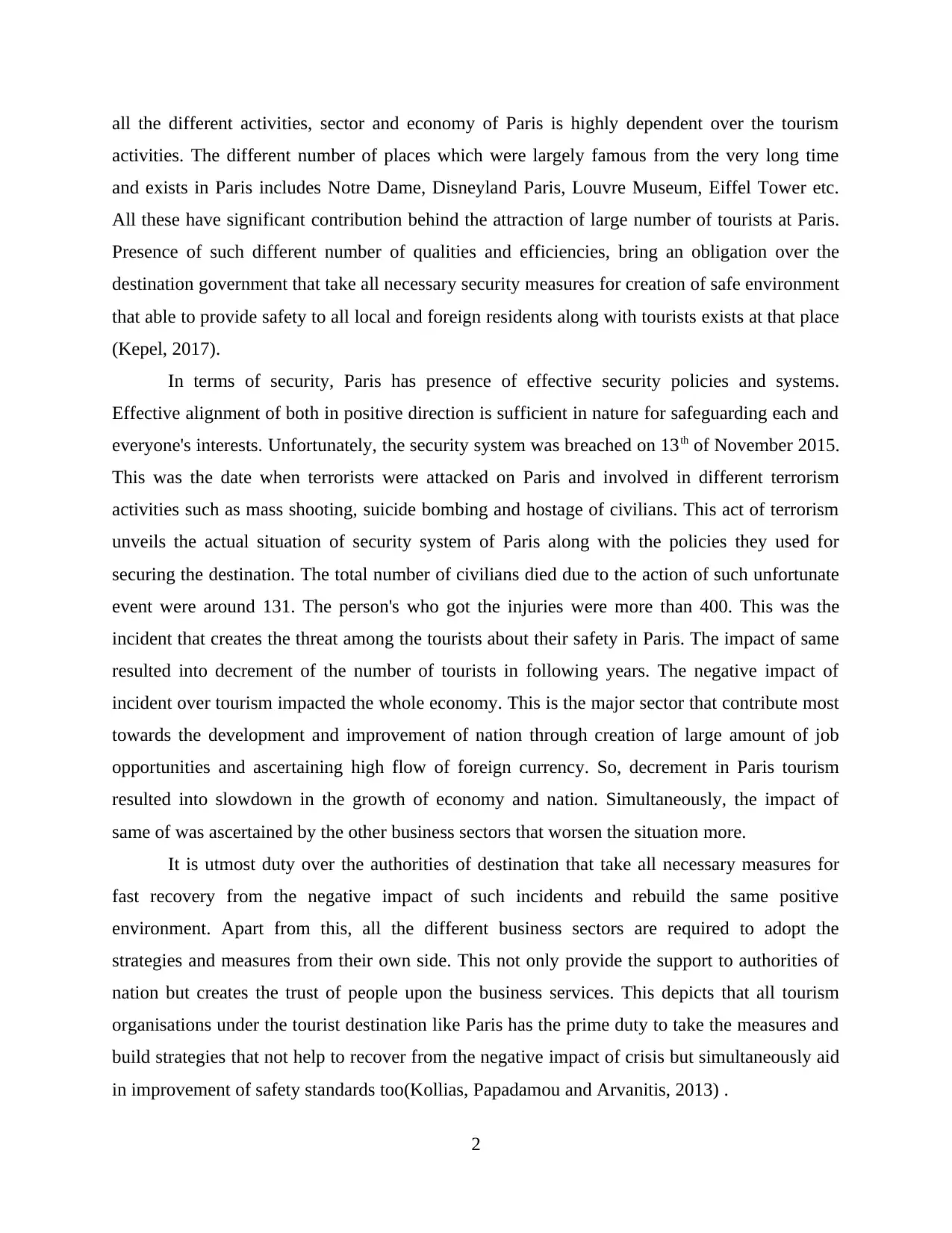
all the different activities, sector and economy of Paris is highly dependent over the tourism
activities. The different number of places which were largely famous from the very long time
and exists in Paris includes Notre Dame, Disneyland Paris, Louvre Museum, Eiffel Tower etc.
All these have significant contribution behind the attraction of large number of tourists at Paris.
Presence of such different number of qualities and efficiencies, bring an obligation over the
destination government that take all necessary security measures for creation of safe environment
that able to provide safety to all local and foreign residents along with tourists exists at that place
(Kepel, 2017).
In terms of security, Paris has presence of effective security policies and systems.
Effective alignment of both in positive direction is sufficient in nature for safeguarding each and
everyone's interests. Unfortunately, the security system was breached on 13th of November 2015.
This was the date when terrorists were attacked on Paris and involved in different terrorism
activities such as mass shooting, suicide bombing and hostage of civilians. This act of terrorism
unveils the actual situation of security system of Paris along with the policies they used for
securing the destination. The total number of civilians died due to the action of such unfortunate
event were around 131. The person's who got the injuries were more than 400. This was the
incident that creates the threat among the tourists about their safety in Paris. The impact of same
resulted into decrement of the number of tourists in following years. The negative impact of
incident over tourism impacted the whole economy. This is the major sector that contribute most
towards the development and improvement of nation through creation of large amount of job
opportunities and ascertaining high flow of foreign currency. So, decrement in Paris tourism
resulted into slowdown in the growth of economy and nation. Simultaneously, the impact of
same of was ascertained by the other business sectors that worsen the situation more.
It is utmost duty over the authorities of destination that take all necessary measures for
fast recovery from the negative impact of such incidents and rebuild the same positive
environment. Apart from this, all the different business sectors are required to adopt the
strategies and measures from their own side. This not only provide the support to authorities of
nation but creates the trust of people upon the business services. This depicts that all tourism
organisations under the tourist destination like Paris has the prime duty to take the measures and
build strategies that not help to recover from the negative impact of crisis but simultaneously aid
in improvement of safety standards too(Kollias, Papadamou and Arvanitis, 2013) .
2
activities. The different number of places which were largely famous from the very long time
and exists in Paris includes Notre Dame, Disneyland Paris, Louvre Museum, Eiffel Tower etc.
All these have significant contribution behind the attraction of large number of tourists at Paris.
Presence of such different number of qualities and efficiencies, bring an obligation over the
destination government that take all necessary security measures for creation of safe environment
that able to provide safety to all local and foreign residents along with tourists exists at that place
(Kepel, 2017).
In terms of security, Paris has presence of effective security policies and systems.
Effective alignment of both in positive direction is sufficient in nature for safeguarding each and
everyone's interests. Unfortunately, the security system was breached on 13th of November 2015.
This was the date when terrorists were attacked on Paris and involved in different terrorism
activities such as mass shooting, suicide bombing and hostage of civilians. This act of terrorism
unveils the actual situation of security system of Paris along with the policies they used for
securing the destination. The total number of civilians died due to the action of such unfortunate
event were around 131. The person's who got the injuries were more than 400. This was the
incident that creates the threat among the tourists about their safety in Paris. The impact of same
resulted into decrement of the number of tourists in following years. The negative impact of
incident over tourism impacted the whole economy. This is the major sector that contribute most
towards the development and improvement of nation through creation of large amount of job
opportunities and ascertaining high flow of foreign currency. So, decrement in Paris tourism
resulted into slowdown in the growth of economy and nation. Simultaneously, the impact of
same of was ascertained by the other business sectors that worsen the situation more.
It is utmost duty over the authorities of destination that take all necessary measures for
fast recovery from the negative impact of such incidents and rebuild the same positive
environment. Apart from this, all the different business sectors are required to adopt the
strategies and measures from their own side. This not only provide the support to authorities of
nation but creates the trust of people upon the business services. This depicts that all tourism
organisations under the tourist destination like Paris has the prime duty to take the measures and
build strategies that not help to recover from the negative impact of crisis but simultaneously aid
in improvement of safety standards too(Kollias, Papadamou and Arvanitis, 2013) .
2
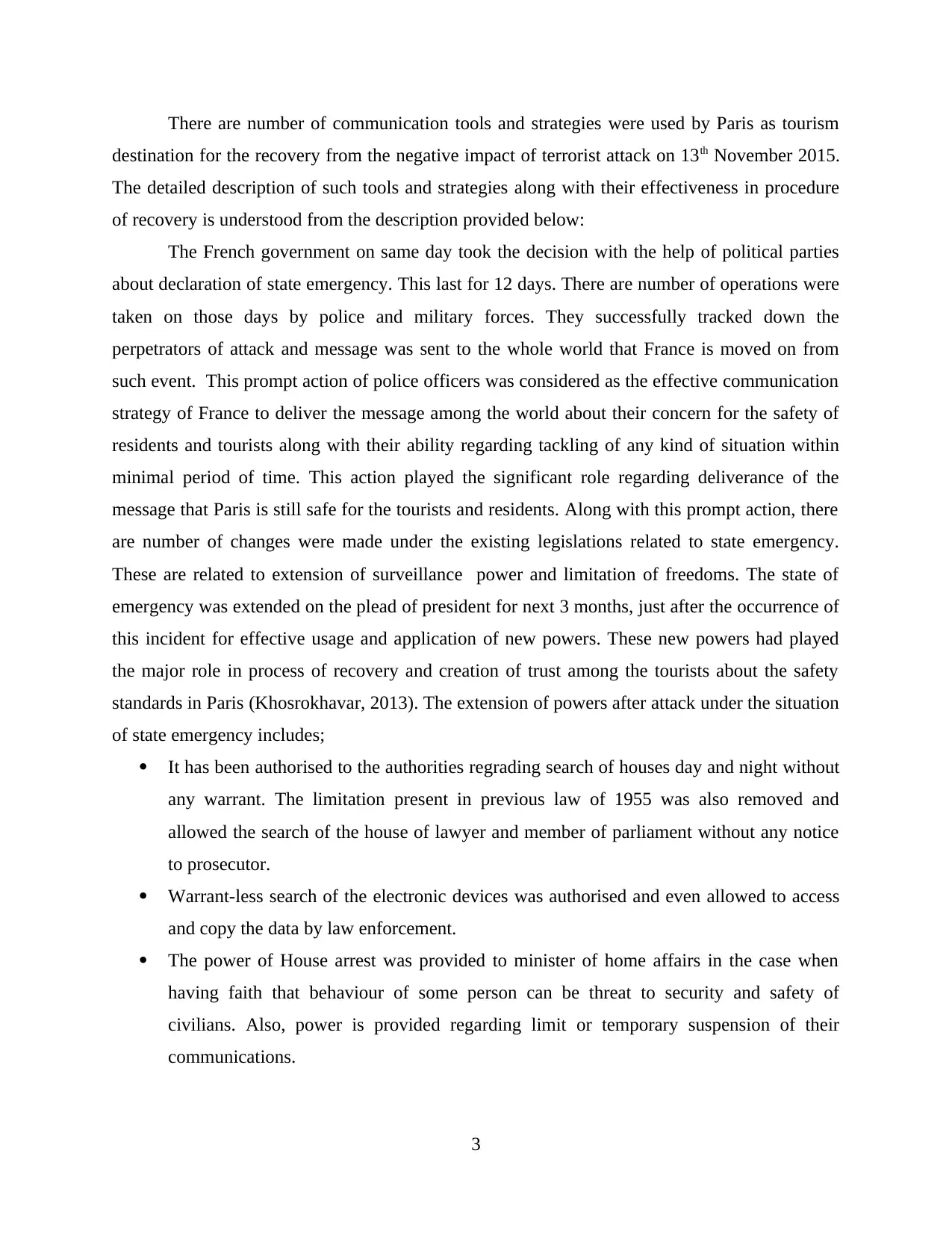
There are number of communication tools and strategies were used by Paris as tourism
destination for the recovery from the negative impact of terrorist attack on 13th November 2015.
The detailed description of such tools and strategies along with their effectiveness in procedure
of recovery is understood from the description provided below:
The French government on same day took the decision with the help of political parties
about declaration of state emergency. This last for 12 days. There are number of operations were
taken on those days by police and military forces. They successfully tracked down the
perpetrators of attack and message was sent to the whole world that France is moved on from
such event. This prompt action of police officers was considered as the effective communication
strategy of France to deliver the message among the world about their concern for the safety of
residents and tourists along with their ability regarding tackling of any kind of situation within
minimal period of time. This action played the significant role regarding deliverance of the
message that Paris is still safe for the tourists and residents. Along with this prompt action, there
are number of changes were made under the existing legislations related to state emergency.
These are related to extension of surveillance power and limitation of freedoms. The state of
emergency was extended on the plead of president for next 3 months, just after the occurrence of
this incident for effective usage and application of new powers. These new powers had played
the major role in process of recovery and creation of trust among the tourists about the safety
standards in Paris (Khosrokhavar, 2013). The extension of powers after attack under the situation
of state emergency includes;
It has been authorised to the authorities regrading search of houses day and night without
any warrant. The limitation present in previous law of 1955 was also removed and
allowed the search of the house of lawyer and member of parliament without any notice
to prosecutor.
Warrant-less search of the electronic devices was authorised and even allowed to access
and copy the data by law enforcement.
The power of House arrest was provided to minister of home affairs in the case when
having faith that behaviour of some person can be threat to security and safety of
civilians. Also, power is provided regarding limit or temporary suspension of their
communications.
3
destination for the recovery from the negative impact of terrorist attack on 13th November 2015.
The detailed description of such tools and strategies along with their effectiveness in procedure
of recovery is understood from the description provided below:
The French government on same day took the decision with the help of political parties
about declaration of state emergency. This last for 12 days. There are number of operations were
taken on those days by police and military forces. They successfully tracked down the
perpetrators of attack and message was sent to the whole world that France is moved on from
such event. This prompt action of police officers was considered as the effective communication
strategy of France to deliver the message among the world about their concern for the safety of
residents and tourists along with their ability regarding tackling of any kind of situation within
minimal period of time. This action played the significant role regarding deliverance of the
message that Paris is still safe for the tourists and residents. Along with this prompt action, there
are number of changes were made under the existing legislations related to state emergency.
These are related to extension of surveillance power and limitation of freedoms. The state of
emergency was extended on the plead of president for next 3 months, just after the occurrence of
this incident for effective usage and application of new powers. These new powers had played
the major role in process of recovery and creation of trust among the tourists about the safety
standards in Paris (Khosrokhavar, 2013). The extension of powers after attack under the situation
of state emergency includes;
It has been authorised to the authorities regrading search of houses day and night without
any warrant. The limitation present in previous law of 1955 was also removed and
allowed the search of the house of lawyer and member of parliament without any notice
to prosecutor.
Warrant-less search of the electronic devices was authorised and even allowed to access
and copy the data by law enforcement.
The power of House arrest was provided to minister of home affairs in the case when
having faith that behaviour of some person can be threat to security and safety of
civilians. Also, power is provided regarding limit or temporary suspension of their
communications.
3
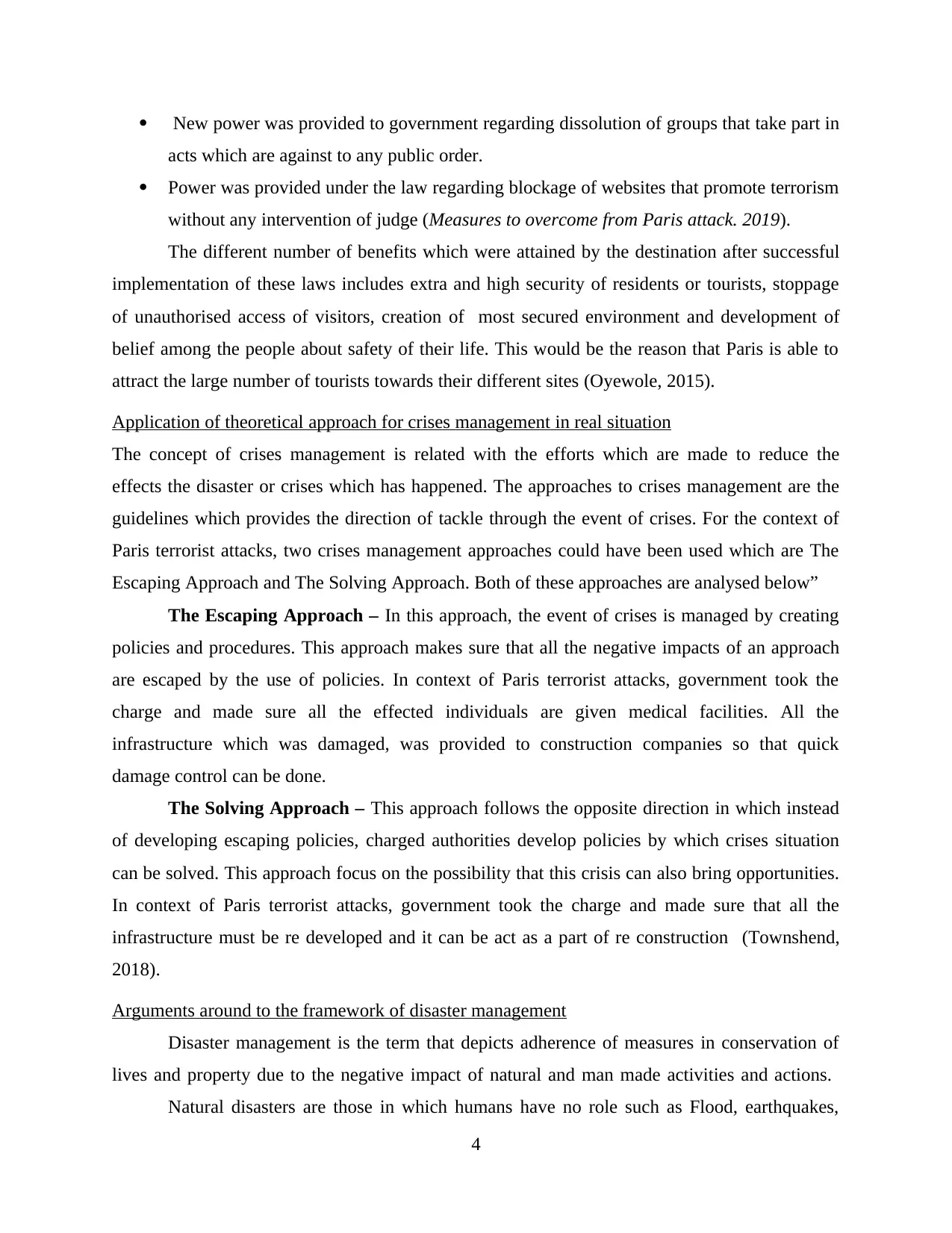
New power was provided to government regarding dissolution of groups that take part in
acts which are against to any public order.
Power was provided under the law regarding blockage of websites that promote terrorism
without any intervention of judge (Measures to overcome from Paris attack. 2019).
The different number of benefits which were attained by the destination after successful
implementation of these laws includes extra and high security of residents or tourists, stoppage
of unauthorised access of visitors, creation of most secured environment and development of
belief among the people about safety of their life. This would be the reason that Paris is able to
attract the large number of tourists towards their different sites (Oyewole, 2015).
Application of theoretical approach for crises management in real situation
The concept of crises management is related with the efforts which are made to reduce the
effects the disaster or crises which has happened. The approaches to crises management are the
guidelines which provides the direction of tackle through the event of crises. For the context of
Paris terrorist attacks, two crises management approaches could have been used which are The
Escaping Approach and The Solving Approach. Both of these approaches are analysed below”
The Escaping Approach – In this approach, the event of crises is managed by creating
policies and procedures. This approach makes sure that all the negative impacts of an approach
are escaped by the use of policies. In context of Paris terrorist attacks, government took the
charge and made sure all the effected individuals are given medical facilities. All the
infrastructure which was damaged, was provided to construction companies so that quick
damage control can be done.
The Solving Approach – This approach follows the opposite direction in which instead
of developing escaping policies, charged authorities develop policies by which crises situation
can be solved. This approach focus on the possibility that this crisis can also bring opportunities.
In context of Paris terrorist attacks, government took the charge and made sure that all the
infrastructure must be re developed and it can be act as a part of re construction (Townshend,
2018).
Arguments around to the framework of disaster management
Disaster management is the term that depicts adherence of measures in conservation of
lives and property due to the negative impact of natural and man made activities and actions.
Natural disasters are those in which humans have no role such as Flood, earthquakes,
4
acts which are against to any public order.
Power was provided under the law regarding blockage of websites that promote terrorism
without any intervention of judge (Measures to overcome from Paris attack. 2019).
The different number of benefits which were attained by the destination after successful
implementation of these laws includes extra and high security of residents or tourists, stoppage
of unauthorised access of visitors, creation of most secured environment and development of
belief among the people about safety of their life. This would be the reason that Paris is able to
attract the large number of tourists towards their different sites (Oyewole, 2015).
Application of theoretical approach for crises management in real situation
The concept of crises management is related with the efforts which are made to reduce the
effects the disaster or crises which has happened. The approaches to crises management are the
guidelines which provides the direction of tackle through the event of crises. For the context of
Paris terrorist attacks, two crises management approaches could have been used which are The
Escaping Approach and The Solving Approach. Both of these approaches are analysed below”
The Escaping Approach – In this approach, the event of crises is managed by creating
policies and procedures. This approach makes sure that all the negative impacts of an approach
are escaped by the use of policies. In context of Paris terrorist attacks, government took the
charge and made sure all the effected individuals are given medical facilities. All the
infrastructure which was damaged, was provided to construction companies so that quick
damage control can be done.
The Solving Approach – This approach follows the opposite direction in which instead
of developing escaping policies, charged authorities develop policies by which crises situation
can be solved. This approach focus on the possibility that this crisis can also bring opportunities.
In context of Paris terrorist attacks, government took the charge and made sure that all the
infrastructure must be re developed and it can be act as a part of re construction (Townshend,
2018).
Arguments around to the framework of disaster management
Disaster management is the term that depicts adherence of measures in conservation of
lives and property due to the negative impact of natural and man made activities and actions.
Natural disasters are those in which humans have no role such as Flood, earthquakes,
4
Paraphrase This Document
Need a fresh take? Get an instant paraphrase of this document with our AI Paraphraser
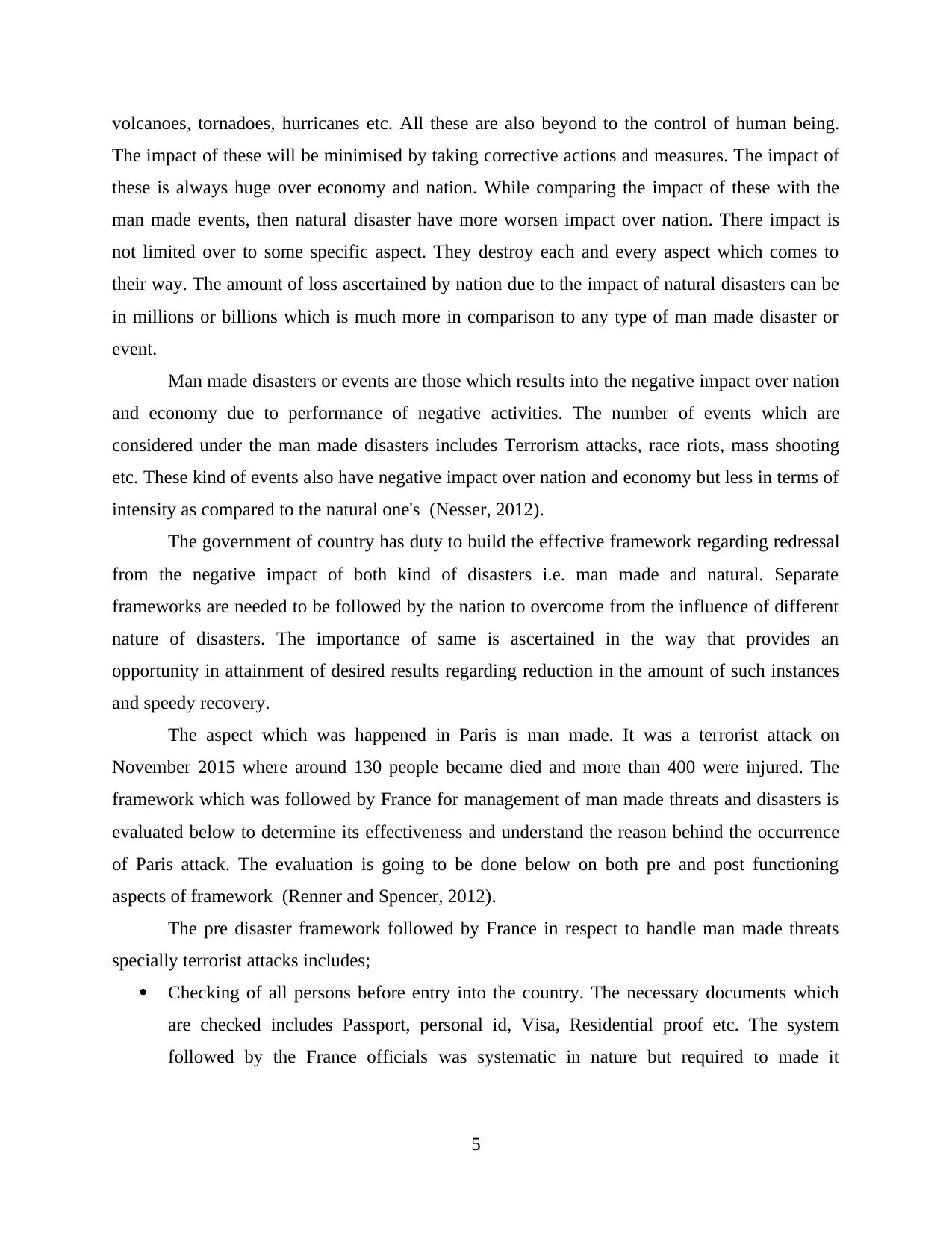
volcanoes, tornadoes, hurricanes etc. All these are also beyond to the control of human being.
The impact of these will be minimised by taking corrective actions and measures. The impact of
these is always huge over economy and nation. While comparing the impact of these with the
man made events, then natural disaster have more worsen impact over nation. There impact is
not limited over to some specific aspect. They destroy each and every aspect which comes to
their way. The amount of loss ascertained by nation due to the impact of natural disasters can be
in millions or billions which is much more in comparison to any type of man made disaster or
event.
Man made disasters or events are those which results into the negative impact over nation
and economy due to performance of negative activities. The number of events which are
considered under the man made disasters includes Terrorism attacks, race riots, mass shooting
etc. These kind of events also have negative impact over nation and economy but less in terms of
intensity as compared to the natural one's (Nesser, 2012).
The government of country has duty to build the effective framework regarding redressal
from the negative impact of both kind of disasters i.e. man made and natural. Separate
frameworks are needed to be followed by the nation to overcome from the influence of different
nature of disasters. The importance of same is ascertained in the way that provides an
opportunity in attainment of desired results regarding reduction in the amount of such instances
and speedy recovery.
The aspect which was happened in Paris is man made. It was a terrorist attack on
November 2015 where around 130 people became died and more than 400 were injured. The
framework which was followed by France for management of man made threats and disasters is
evaluated below to determine its effectiveness and understand the reason behind the occurrence
of Paris attack. The evaluation is going to be done below on both pre and post functioning
aspects of framework (Renner and Spencer, 2012).
The pre disaster framework followed by France in respect to handle man made threats
specially terrorist attacks includes;
Checking of all persons before entry into the country. The necessary documents which
are checked includes Passport, personal id, Visa, Residential proof etc. The system
followed by the France officials was systematic in nature but required to made it
5
The impact of these will be minimised by taking corrective actions and measures. The impact of
these is always huge over economy and nation. While comparing the impact of these with the
man made events, then natural disaster have more worsen impact over nation. There impact is
not limited over to some specific aspect. They destroy each and every aspect which comes to
their way. The amount of loss ascertained by nation due to the impact of natural disasters can be
in millions or billions which is much more in comparison to any type of man made disaster or
event.
Man made disasters or events are those which results into the negative impact over nation
and economy due to performance of negative activities. The number of events which are
considered under the man made disasters includes Terrorism attacks, race riots, mass shooting
etc. These kind of events also have negative impact over nation and economy but less in terms of
intensity as compared to the natural one's (Nesser, 2012).
The government of country has duty to build the effective framework regarding redressal
from the negative impact of both kind of disasters i.e. man made and natural. Separate
frameworks are needed to be followed by the nation to overcome from the influence of different
nature of disasters. The importance of same is ascertained in the way that provides an
opportunity in attainment of desired results regarding reduction in the amount of such instances
and speedy recovery.
The aspect which was happened in Paris is man made. It was a terrorist attack on
November 2015 where around 130 people became died and more than 400 were injured. The
framework which was followed by France for management of man made threats and disasters is
evaluated below to determine its effectiveness and understand the reason behind the occurrence
of Paris attack. The evaluation is going to be done below on both pre and post functioning
aspects of framework (Renner and Spencer, 2012).
The pre disaster framework followed by France in respect to handle man made threats
specially terrorist attacks includes;
Checking of all persons before entry into the country. The necessary documents which
are checked includes Passport, personal id, Visa, Residential proof etc. The system
followed by the France officials was systematic in nature but required to made it
5
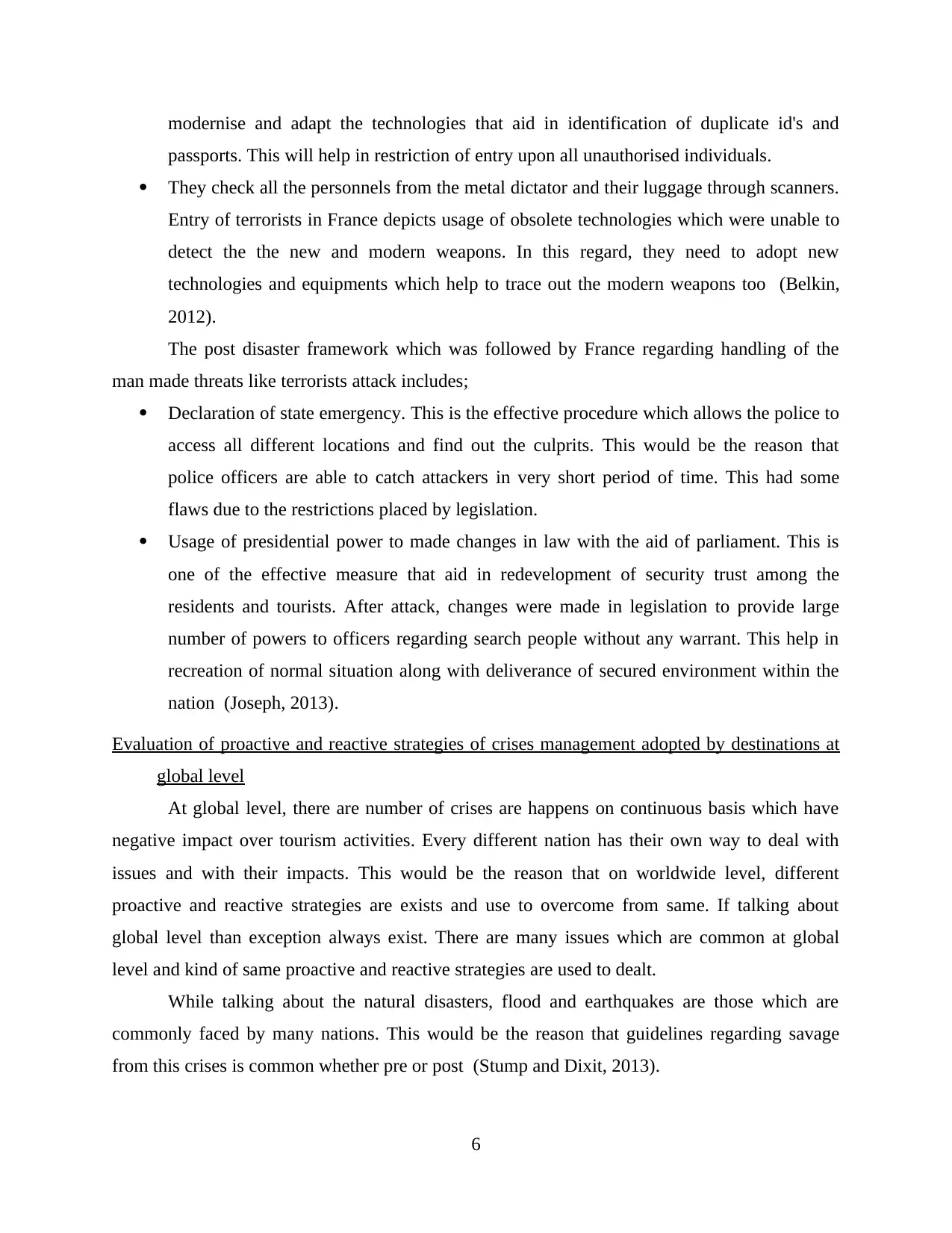
modernise and adapt the technologies that aid in identification of duplicate id's and
passports. This will help in restriction of entry upon all unauthorised individuals.
They check all the personnels from the metal dictator and their luggage through scanners.
Entry of terrorists in France depicts usage of obsolete technologies which were unable to
detect the the new and modern weapons. In this regard, they need to adopt new
technologies and equipments which help to trace out the modern weapons too (Belkin,
2012).
The post disaster framework which was followed by France regarding handling of the
man made threats like terrorists attack includes;
Declaration of state emergency. This is the effective procedure which allows the police to
access all different locations and find out the culprits. This would be the reason that
police officers are able to catch attackers in very short period of time. This had some
flaws due to the restrictions placed by legislation.
Usage of presidential power to made changes in law with the aid of parliament. This is
one of the effective measure that aid in redevelopment of security trust among the
residents and tourists. After attack, changes were made in legislation to provide large
number of powers to officers regarding search people without any warrant. This help in
recreation of normal situation along with deliverance of secured environment within the
nation (Joseph, 2013).
Evaluation of proactive and reactive strategies of crises management adopted by destinations at
global level
At global level, there are number of crises are happens on continuous basis which have
negative impact over tourism activities. Every different nation has their own way to deal with
issues and with their impacts. This would be the reason that on worldwide level, different
proactive and reactive strategies are exists and use to overcome from same. If talking about
global level than exception always exist. There are many issues which are common at global
level and kind of same proactive and reactive strategies are used to dealt.
While talking about the natural disasters, flood and earthquakes are those which are
commonly faced by many nations. This would be the reason that guidelines regarding savage
from this crises is common whether pre or post (Stump and Dixit, 2013).
6
passports. This will help in restriction of entry upon all unauthorised individuals.
They check all the personnels from the metal dictator and their luggage through scanners.
Entry of terrorists in France depicts usage of obsolete technologies which were unable to
detect the the new and modern weapons. In this regard, they need to adopt new
technologies and equipments which help to trace out the modern weapons too (Belkin,
2012).
The post disaster framework which was followed by France regarding handling of the
man made threats like terrorists attack includes;
Declaration of state emergency. This is the effective procedure which allows the police to
access all different locations and find out the culprits. This would be the reason that
police officers are able to catch attackers in very short period of time. This had some
flaws due to the restrictions placed by legislation.
Usage of presidential power to made changes in law with the aid of parliament. This is
one of the effective measure that aid in redevelopment of security trust among the
residents and tourists. After attack, changes were made in legislation to provide large
number of powers to officers regarding search people without any warrant. This help in
recreation of normal situation along with deliverance of secured environment within the
nation (Joseph, 2013).
Evaluation of proactive and reactive strategies of crises management adopted by destinations at
global level
At global level, there are number of crises are happens on continuous basis which have
negative impact over tourism activities. Every different nation has their own way to deal with
issues and with their impacts. This would be the reason that on worldwide level, different
proactive and reactive strategies are exists and use to overcome from same. If talking about
global level than exception always exist. There are many issues which are common at global
level and kind of same proactive and reactive strategies are used to dealt.
While talking about the natural disasters, flood and earthquakes are those which are
commonly faced by many nations. This would be the reason that guidelines regarding savage
from this crises is common whether pre or post (Stump and Dixit, 2013).
6
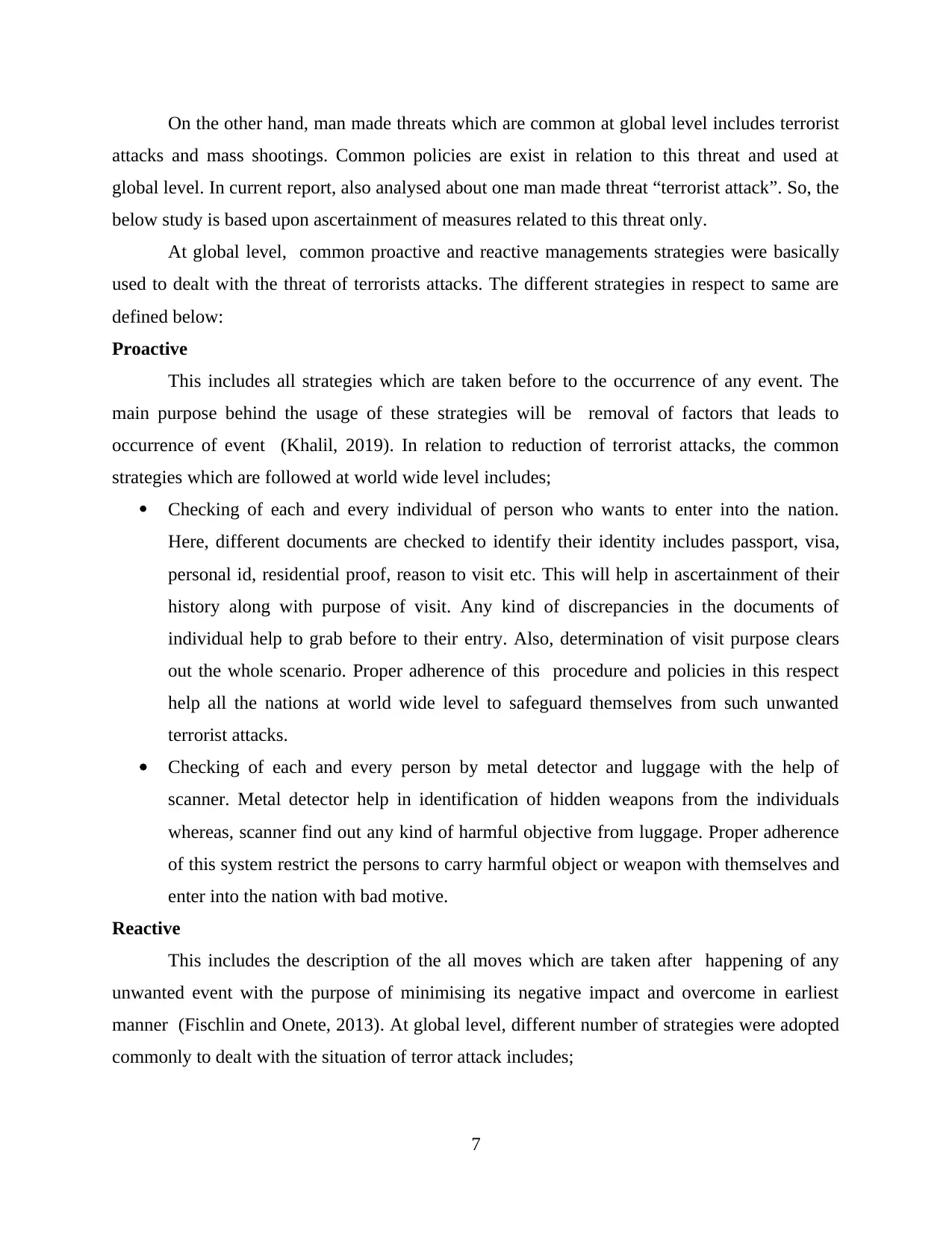
On the other hand, man made threats which are common at global level includes terrorist
attacks and mass shootings. Common policies are exist in relation to this threat and used at
global level. In current report, also analysed about one man made threat “terrorist attack”. So, the
below study is based upon ascertainment of measures related to this threat only.
At global level, common proactive and reactive managements strategies were basically
used to dealt with the threat of terrorists attacks. The different strategies in respect to same are
defined below:
Proactive
This includes all strategies which are taken before to the occurrence of any event. The
main purpose behind the usage of these strategies will be removal of factors that leads to
occurrence of event (Khalil, 2019). In relation to reduction of terrorist attacks, the common
strategies which are followed at world wide level includes;
Checking of each and every individual of person who wants to enter into the nation.
Here, different documents are checked to identify their identity includes passport, visa,
personal id, residential proof, reason to visit etc. This will help in ascertainment of their
history along with purpose of visit. Any kind of discrepancies in the documents of
individual help to grab before to their entry. Also, determination of visit purpose clears
out the whole scenario. Proper adherence of this procedure and policies in this respect
help all the nations at world wide level to safeguard themselves from such unwanted
terrorist attacks.
Checking of each and every person by metal detector and luggage with the help of
scanner. Metal detector help in identification of hidden weapons from the individuals
whereas, scanner find out any kind of harmful objective from luggage. Proper adherence
of this system restrict the persons to carry harmful object or weapon with themselves and
enter into the nation with bad motive.
Reactive
This includes the description of the all moves which are taken after happening of any
unwanted event with the purpose of minimising its negative impact and overcome in earliest
manner (Fischlin and Onete, 2013). At global level, different number of strategies were adopted
commonly to dealt with the situation of terror attack includes;
7
attacks and mass shootings. Common policies are exist in relation to this threat and used at
global level. In current report, also analysed about one man made threat “terrorist attack”. So, the
below study is based upon ascertainment of measures related to this threat only.
At global level, common proactive and reactive managements strategies were basically
used to dealt with the threat of terrorists attacks. The different strategies in respect to same are
defined below:
Proactive
This includes all strategies which are taken before to the occurrence of any event. The
main purpose behind the usage of these strategies will be removal of factors that leads to
occurrence of event (Khalil, 2019). In relation to reduction of terrorist attacks, the common
strategies which are followed at world wide level includes;
Checking of each and every individual of person who wants to enter into the nation.
Here, different documents are checked to identify their identity includes passport, visa,
personal id, residential proof, reason to visit etc. This will help in ascertainment of their
history along with purpose of visit. Any kind of discrepancies in the documents of
individual help to grab before to their entry. Also, determination of visit purpose clears
out the whole scenario. Proper adherence of this procedure and policies in this respect
help all the nations at world wide level to safeguard themselves from such unwanted
terrorist attacks.
Checking of each and every person by metal detector and luggage with the help of
scanner. Metal detector help in identification of hidden weapons from the individuals
whereas, scanner find out any kind of harmful objective from luggage. Proper adherence
of this system restrict the persons to carry harmful object or weapon with themselves and
enter into the nation with bad motive.
Reactive
This includes the description of the all moves which are taken after happening of any
unwanted event with the purpose of minimising its negative impact and overcome in earliest
manner (Fischlin and Onete, 2013). At global level, different number of strategies were adopted
commonly to dealt with the situation of terror attack includes;
7
Secure Best Marks with AI Grader
Need help grading? Try our AI Grader for instant feedback on your assignments.
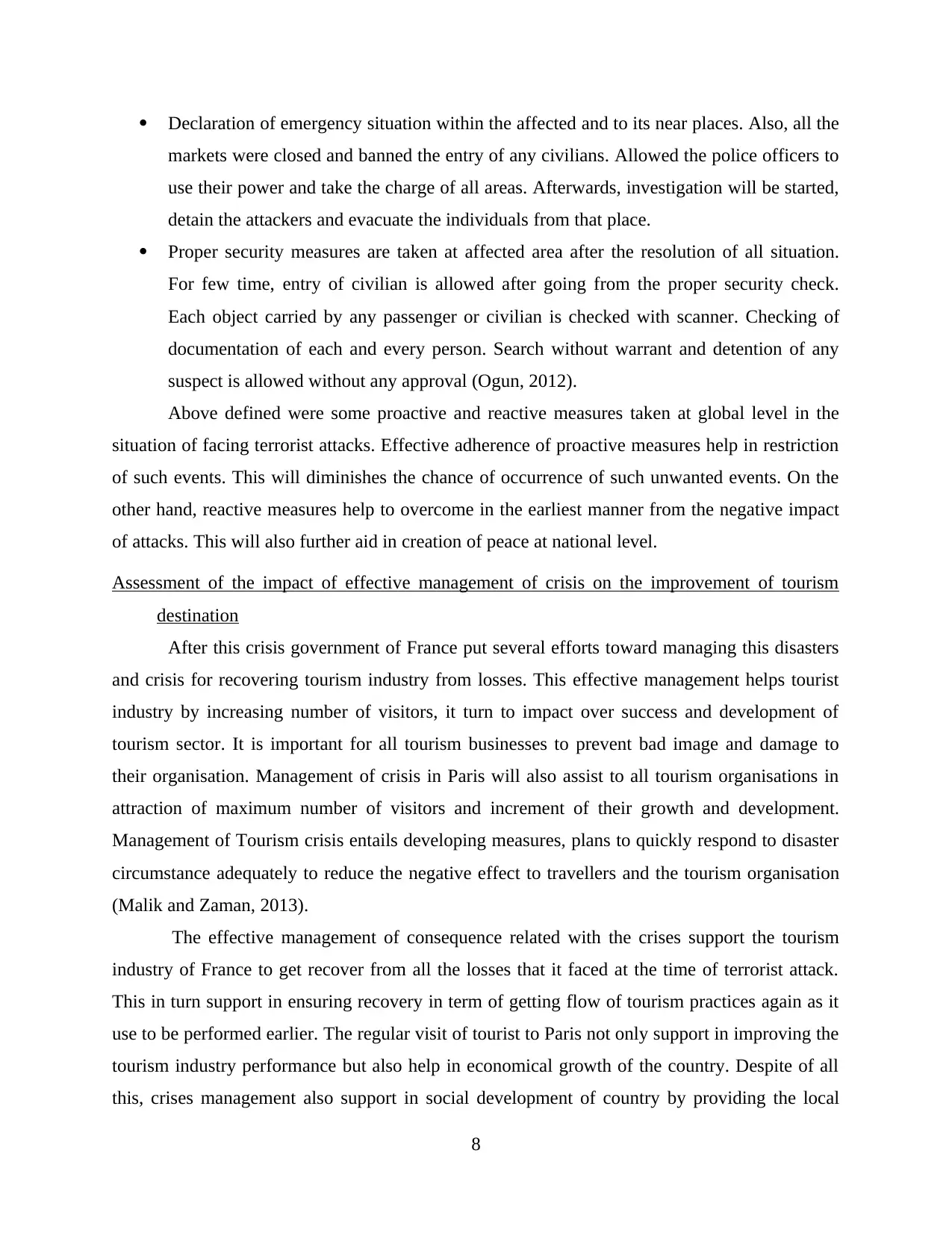
Declaration of emergency situation within the affected and to its near places. Also, all the
markets were closed and banned the entry of any civilians. Allowed the police officers to
use their power and take the charge of all areas. Afterwards, investigation will be started,
detain the attackers and evacuate the individuals from that place.
Proper security measures are taken at affected area after the resolution of all situation.
For few time, entry of civilian is allowed after going from the proper security check.
Each object carried by any passenger or civilian is checked with scanner. Checking of
documentation of each and every person. Search without warrant and detention of any
suspect is allowed without any approval (Ogun, 2012).
Above defined were some proactive and reactive measures taken at global level in the
situation of facing terrorist attacks. Effective adherence of proactive measures help in restriction
of such events. This will diminishes the chance of occurrence of such unwanted events. On the
other hand, reactive measures help to overcome in the earliest manner from the negative impact
of attacks. This will also further aid in creation of peace at national level.
Assessment of the impact of effective management of crisis on the improvement of tourism
destination
After this crisis government of France put several efforts toward managing this disasters
and crisis for recovering tourism industry from losses. This effective management helps tourist
industry by increasing number of visitors, it turn to impact over success and development of
tourism sector. It is important for all tourism businesses to prevent bad image and damage to
their organisation. Management of crisis in Paris will also assist to all tourism organisations in
attraction of maximum number of visitors and increment of their growth and development.
Management of Tourism crisis entails developing measures, plans to quickly respond to disaster
circumstance adequately to reduce the negative effect to travellers and the tourism organisation
(Malik and Zaman, 2013).
The effective management of consequence related with the crises support the tourism
industry of France to get recover from all the losses that it faced at the time of terrorist attack.
This in turn support in ensuring recovery in term of getting flow of tourism practices again as it
use to be performed earlier. The regular visit of tourist to Paris not only support in improving the
tourism industry performance but also help in economical growth of the country. Despite of all
this, crises management also support in social development of country by providing the local
8
markets were closed and banned the entry of any civilians. Allowed the police officers to
use their power and take the charge of all areas. Afterwards, investigation will be started,
detain the attackers and evacuate the individuals from that place.
Proper security measures are taken at affected area after the resolution of all situation.
For few time, entry of civilian is allowed after going from the proper security check.
Each object carried by any passenger or civilian is checked with scanner. Checking of
documentation of each and every person. Search without warrant and detention of any
suspect is allowed without any approval (Ogun, 2012).
Above defined were some proactive and reactive measures taken at global level in the
situation of facing terrorist attacks. Effective adherence of proactive measures help in restriction
of such events. This will diminishes the chance of occurrence of such unwanted events. On the
other hand, reactive measures help to overcome in the earliest manner from the negative impact
of attacks. This will also further aid in creation of peace at national level.
Assessment of the impact of effective management of crisis on the improvement of tourism
destination
After this crisis government of France put several efforts toward managing this disasters
and crisis for recovering tourism industry from losses. This effective management helps tourist
industry by increasing number of visitors, it turn to impact over success and development of
tourism sector. It is important for all tourism businesses to prevent bad image and damage to
their organisation. Management of crisis in Paris will also assist to all tourism organisations in
attraction of maximum number of visitors and increment of their growth and development.
Management of Tourism crisis entails developing measures, plans to quickly respond to disaster
circumstance adequately to reduce the negative effect to travellers and the tourism organisation
(Malik and Zaman, 2013).
The effective management of consequence related with the crises support the tourism
industry of France to get recover from all the losses that it faced at the time of terrorist attack.
This in turn support in ensuring recovery in term of getting flow of tourism practices again as it
use to be performed earlier. The regular visit of tourist to Paris not only support in improving the
tourism industry performance but also help in economical growth of the country. Despite of all
this, crises management also support in social development of country by providing the local
8
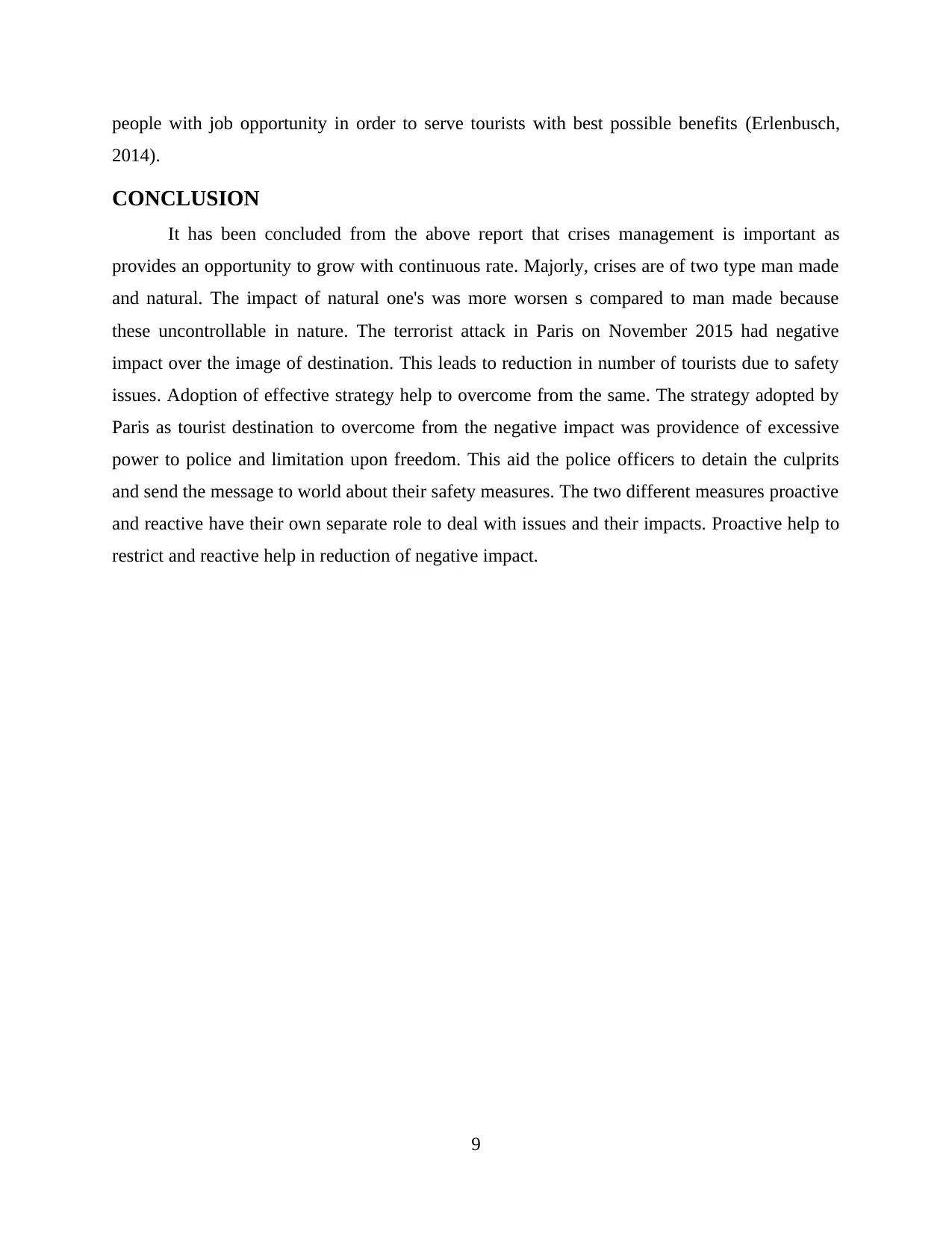
people with job opportunity in order to serve tourists with best possible benefits (Erlenbusch,
2014).
CONCLUSION
It has been concluded from the above report that crises management is important as
provides an opportunity to grow with continuous rate. Majorly, crises are of two type man made
and natural. The impact of natural one's was more worsen s compared to man made because
these uncontrollable in nature. The terrorist attack in Paris on November 2015 had negative
impact over the image of destination. This leads to reduction in number of tourists due to safety
issues. Adoption of effective strategy help to overcome from the same. The strategy adopted by
Paris as tourist destination to overcome from the negative impact was providence of excessive
power to police and limitation upon freedom. This aid the police officers to detain the culprits
and send the message to world about their safety measures. The two different measures proactive
and reactive have their own separate role to deal with issues and their impacts. Proactive help to
restrict and reactive help in reduction of negative impact.
9
2014).
CONCLUSION
It has been concluded from the above report that crises management is important as
provides an opportunity to grow with continuous rate. Majorly, crises are of two type man made
and natural. The impact of natural one's was more worsen s compared to man made because
these uncontrollable in nature. The terrorist attack in Paris on November 2015 had negative
impact over the image of destination. This leads to reduction in number of tourists due to safety
issues. Adoption of effective strategy help to overcome from the same. The strategy adopted by
Paris as tourist destination to overcome from the negative impact was providence of excessive
power to police and limitation upon freedom. This aid the police officers to detain the culprits
and send the message to world about their safety measures. The two different measures proactive
and reactive have their own separate role to deal with issues and their impacts. Proactive help to
restrict and reactive help in reduction of negative impact.
9
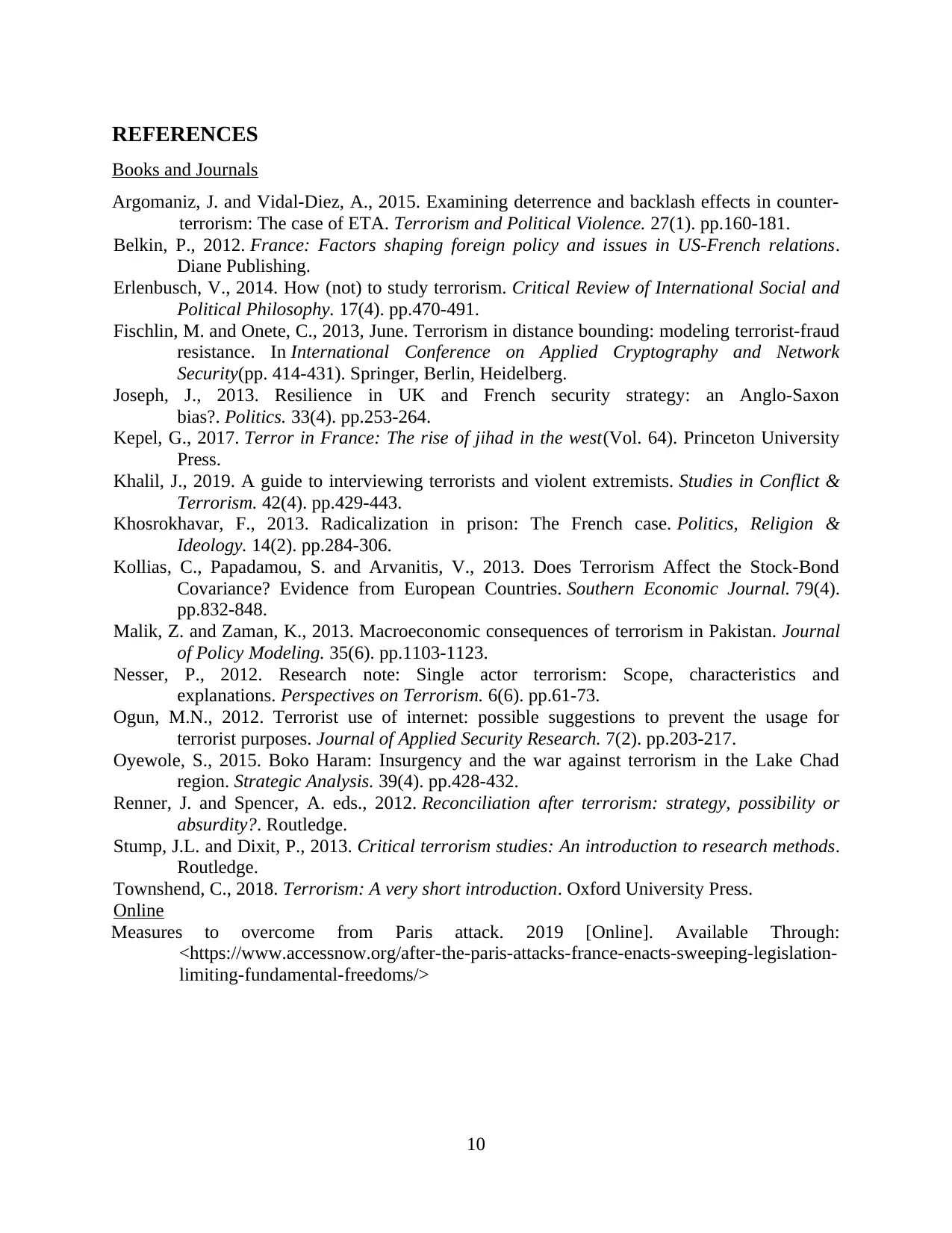
REFERENCES
Books and Journals
Argomaniz, J. and Vidal-Diez, A., 2015. Examining deterrence and backlash effects in counter-
terrorism: The case of ETA. Terrorism and Political Violence. 27(1). pp.160-181.
Belkin, P., 2012. France: Factors shaping foreign policy and issues in US-French relations.
Diane Publishing.
Erlenbusch, V., 2014. How (not) to study terrorism. Critical Review of International Social and
Political Philosophy. 17(4). pp.470-491.
Fischlin, M. and Onete, C., 2013, June. Terrorism in distance bounding: modeling terrorist-fraud
resistance. In International Conference on Applied Cryptography and Network
Security(pp. 414-431). Springer, Berlin, Heidelberg.
Joseph, J., 2013. Resilience in UK and French security strategy: an Anglo-Saxon
bias?. Politics. 33(4). pp.253-264.
Kepel, G., 2017. Terror in France: The rise of jihad in the west(Vol. 64). Princeton University
Press.
Khalil, J., 2019. A guide to interviewing terrorists and violent extremists. Studies in Conflict &
Terrorism. 42(4). pp.429-443.
Khosrokhavar, F., 2013. Radicalization in prison: The French case. Politics, Religion &
Ideology. 14(2). pp.284-306.
Kollias, C., Papadamou, S. and Arvanitis, V., 2013. Does Terrorism Affect the Stock‐Bond
Covariance? Evidence from European Countries. Southern Economic Journal. 79(4).
pp.832-848.
Malik, Z. and Zaman, K., 2013. Macroeconomic consequences of terrorism in Pakistan. Journal
of Policy Modeling. 35(6). pp.1103-1123.
Nesser, P., 2012. Research note: Single actor terrorism: Scope, characteristics and
explanations. Perspectives on Terrorism. 6(6). pp.61-73.
Ogun, M.N., 2012. Terrorist use of internet: possible suggestions to prevent the usage for
terrorist purposes. Journal of Applied Security Research. 7(2). pp.203-217.
Oyewole, S., 2015. Boko Haram: Insurgency and the war against terrorism in the Lake Chad
region. Strategic Analysis. 39(4). pp.428-432.
Renner, J. and Spencer, A. eds., 2012. Reconciliation after terrorism: strategy, possibility or
absurdity?. Routledge.
Stump, J.L. and Dixit, P., 2013. Critical terrorism studies: An introduction to research methods.
Routledge.
Townshend, C., 2018. Terrorism: A very short introduction. Oxford University Press.
Online
Measures to overcome from Paris attack. 2019 [Online]. Available Through:
<https://www.accessnow.org/after-the-paris-attacks-france-enacts-sweeping-legislation-
limiting-fundamental-freedoms/>
10
Books and Journals
Argomaniz, J. and Vidal-Diez, A., 2015. Examining deterrence and backlash effects in counter-
terrorism: The case of ETA. Terrorism and Political Violence. 27(1). pp.160-181.
Belkin, P., 2012. France: Factors shaping foreign policy and issues in US-French relations.
Diane Publishing.
Erlenbusch, V., 2014. How (not) to study terrorism. Critical Review of International Social and
Political Philosophy. 17(4). pp.470-491.
Fischlin, M. and Onete, C., 2013, June. Terrorism in distance bounding: modeling terrorist-fraud
resistance. In International Conference on Applied Cryptography and Network
Security(pp. 414-431). Springer, Berlin, Heidelberg.
Joseph, J., 2013. Resilience in UK and French security strategy: an Anglo-Saxon
bias?. Politics. 33(4). pp.253-264.
Kepel, G., 2017. Terror in France: The rise of jihad in the west(Vol. 64). Princeton University
Press.
Khalil, J., 2019. A guide to interviewing terrorists and violent extremists. Studies in Conflict &
Terrorism. 42(4). pp.429-443.
Khosrokhavar, F., 2013. Radicalization in prison: The French case. Politics, Religion &
Ideology. 14(2). pp.284-306.
Kollias, C., Papadamou, S. and Arvanitis, V., 2013. Does Terrorism Affect the Stock‐Bond
Covariance? Evidence from European Countries. Southern Economic Journal. 79(4).
pp.832-848.
Malik, Z. and Zaman, K., 2013. Macroeconomic consequences of terrorism in Pakistan. Journal
of Policy Modeling. 35(6). pp.1103-1123.
Nesser, P., 2012. Research note: Single actor terrorism: Scope, characteristics and
explanations. Perspectives on Terrorism. 6(6). pp.61-73.
Ogun, M.N., 2012. Terrorist use of internet: possible suggestions to prevent the usage for
terrorist purposes. Journal of Applied Security Research. 7(2). pp.203-217.
Oyewole, S., 2015. Boko Haram: Insurgency and the war against terrorism in the Lake Chad
region. Strategic Analysis. 39(4). pp.428-432.
Renner, J. and Spencer, A. eds., 2012. Reconciliation after terrorism: strategy, possibility or
absurdity?. Routledge.
Stump, J.L. and Dixit, P., 2013. Critical terrorism studies: An introduction to research methods.
Routledge.
Townshend, C., 2018. Terrorism: A very short introduction. Oxford University Press.
Online
Measures to overcome from Paris attack. 2019 [Online]. Available Through:
<https://www.accessnow.org/after-the-paris-attacks-france-enacts-sweeping-legislation-
limiting-fundamental-freedoms/>
10
Paraphrase This Document
Need a fresh take? Get an instant paraphrase of this document with our AI Paraphraser

11
1 out of 14
Related Documents
Your All-in-One AI-Powered Toolkit for Academic Success.
+13062052269
info@desklib.com
Available 24*7 on WhatsApp / Email
![[object Object]](/_next/static/media/star-bottom.7253800d.svg)
Unlock your academic potential
© 2024 | Zucol Services PVT LTD | All rights reserved.





